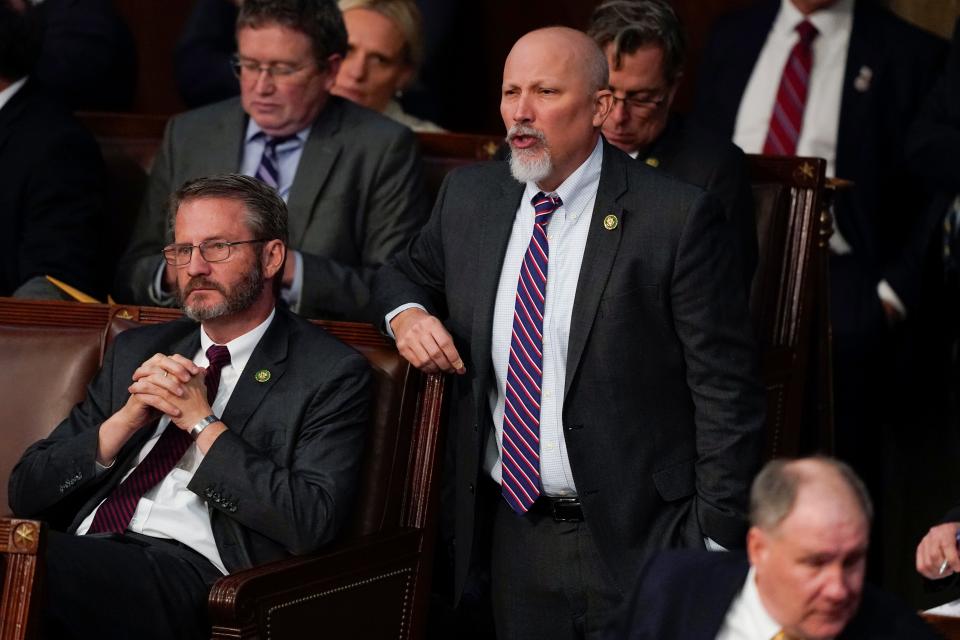Here's how Austin area representatives voted for U.S. House speaker
- Oops!Something went wrong.Please try again later.
- Oops!Something went wrong.Please try again later.
- Oops!Something went wrong.Please try again later.
Austin area Republican Reps. Michael Cloud and Chip Roy were among GOP officials that blocked Rep. Kevin McCarthy from becoming the next speaker of the House on Tuesday after he failed to secure a majority in three rounds of ballots.
Cloud, who represents District 27, which stretches from Bastrop to Corpus Christi, broke from the House GOP leader on Tuesday, choosing instead to vote for Rep. Jim Jordan of Ohio in all three rounds of voting.
Roy, who represents District 21, which runs from Real County east to Hays County, went with Rep. Byron Donalds, of Florida, in the first round of voting before choosing Jordan in the second and third rounds.
McCarthy denied, Santos in House: 5 takeaways from the tumultuous first day of a new Congress
In an impassioned speech on the need for change and debate on the House floor, Roy said: “The American people are watching – and that’s a good thing.”
Gesturing towards McCarthy, who was seated a few feet away, Roy said, “This is not personal,” to which the GOP leader gave a rueful laugh.
“This place hasn’t changed. It has to change,” said Roy, pointing to spending bills that are rammed though without debate. “We have to stop the swamp from running over the American people everyday.”

House Republicans hold a slim majority in the new Congress with 222 seats, and McCarthy could only afford to lose four votes to reach the 218-vote threshold he needs to secure a majority and become speaker. In the first round of voting, 19 Republicans voted for other GOP officials. That triggered a second round, a remarkable moment that underscores a growing division in the Republican Party, and the first time this has happened since 1923. In the second vote, McCarthy also lost 19 GOP votes, and he lost 20 in the third round.
“Congress is broken," Cloud said in a statement Tuesday. "I have worked for months in high hopes and good faith that our conference would chart a course away from the status quo, put us on a path toward fiscal responsibility, and form a Congress in which the elected Representatives would truly be able to work on behalf of the American people.
More:What happens after McCarthy loses speaker vote three times? Here's how the process works.
"I have worked diligently with members of Congress, including Kevin McCarthy, to find agreement on key structural reforms and policy initiatives needed to put our country on the right path. Some progress was made, but ultimately many of the promises made lacked enforcement mechanisms necessary to ensure their implementation, casting doubt on the sincerity of reforms.”
All other GOP lawmakers who represent Central Texas voted for McCarthy: U.S. Reps. John Carter, of Round Rock; Michael McCaul, of Austin; Roger Williams, of Austin; and Pete Sessions, of Waco.
The two Democrats who represent portions of Travis County — U.S. Rep. Lloyd Doggett of Austin and Rep.-elect Greg Casar — voted in line with their party for Democratic Leader Hakeem Jeffries, D-N.Y.
Jeffries earned 212 votes, ahead of McCarthy's 202, but lacked a majority in all three rounds.
The House adjourned Tuesday evening after three ballots, and is scheduled to reconvene at noon Wednesday.
This article originally appeared on Austin American-Statesman: Who Austin area representatives voted for in U.S. House speaker ballot

